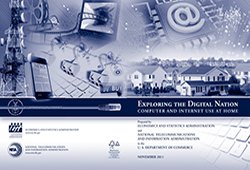Adoption Resources
NTIA is working to increase broadband Internet adoption in the United States, which will help more Americans compete in the 21st century economy. NTIA's initiatives include an annual nationwide survey and report on broadband use, which can inform efforts to close the digital divide, and DigitalLiteracy.gov, a website with resources for teaching and learning computer and online skills.
The NTIA Broadband Adoption Toolkit (23MB pdf) shares best practices across the U.S.
Broadband adoption research
NTIA's Recovery Act broadband programs
The Connecting America’s Communities map illustrates where BTOP projects are located across the country.
Related content
Remarks of Assistant Secretary Strickling at the Practising Law Institute's 29th Annual Telecommunications Policy & Regulation Conference
Remarks by Lawrence E. Strickling
Assistant Secretary of Commerce for Communications and Information
PLI/FCBA Telecommunications Policy & Regulation Institute
Washington, DC
December 8, 2011
—As prepared for delivery—
Exploring the Digital Nation - Computer and Internet Use at Home
 The Department of Commerce's Economics and Statistics Administration (ESA) and National Telecommunications and Information Administration (NTIA) released a report, “Exploring the Digital Nation,” that analyzes broadband Internet adoption in the United States. Overall, approximately seven out of ten households in the United States subscribe to broadband service. The report finds a strong correlation between broadband adoption and socio-economic factors, such as income and education, but says these differences do not explain the entire broadband adoption gap that exists along racial, ethnic, and geographic lines. Even after accounting for socio-economic differences, certain minority and rural households still lag in broadband adoption.
The Department of Commerce's Economics and Statistics Administration (ESA) and National Telecommunications and Information Administration (NTIA) released a report, “Exploring the Digital Nation,” that analyzes broadband Internet adoption in the United States. Overall, approximately seven out of ten households in the United States subscribe to broadband service. The report finds a strong correlation between broadband adoption and socio-economic factors, such as income and education, but says these differences do not explain the entire broadband adoption gap that exists along racial, ethnic, and geographic lines. Even after accounting for socio-economic differences, certain minority and rural households still lag in broadband adoption.
The report analyzes data collected through an Internet Use supplement to the Current Population Survey (CPS) of about 54,300 households conducted by the U.S. Census Bureau in October 2010. Earlier this year, NTIA released initial findings from the survey, showing that while virtually all demographic groups have increased adoption of broadband Internet at home since the prior year, historic disparities among demographic groups remain. This report presents broadband adoption statistics after adjusting for various socio-economic differences.
(NOTE: If not printing in color, select the "grayscale" printer setting to ensure graphics clarity.)
New Commerce Department Report Shows Broadband Adoption Rises but Digital Divide Persists
WASHINGTON – The Department of Commerce's Economics and Statistics Administration (ESA) and National Telecommunications and Information Administration (NTIA) today released a report, “Exploring the Digital Nation,” that analyzes broadband Internet adoption in the United States. Overall, approximately seven out of ten households in the United States subscribe to broadband service.
